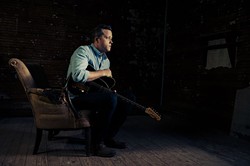On Monday, Jason Isbell — a former member of acclaimed Southern rock outfit Drive-By Truckers — brings his soulful brand of Americana to The Criterion along with Memphis folk-punk darling Lucero.
Isbell gave a shot in the arm to those believers of country music when the Alabama-born singer-songwriter’s album Something More Than Free debuted at No. 1 on the Billboard Country Music chart in 2015. (It also topped U.S. folk, rock and indie charts.)
This might sound contradictory, but it isn’t: The same year that “bro-country” cash machines dumped radio-friendly and clichéd hits on genre fans, Isbell found success with integrity and a whole lot less radio play.
“It’s kind of like the difference between Wal-Mart and a family-owned grocery store. Some people love Wal-Mart and they go to Wal-Mart when they don’t have to,” Isbell said during a recent Oklahoma Gazette interview. “You know, they actually enjoy being there. I worked at one when I was 16 or 17 years old, and I saw about as much of Wal-Mart as I think I ever want to see.”
Isbell offers more than an alternative to this decade’s model of mega pop stars. His music weaves together a vibrant tapestry of autobiographical experience, alternative country, Southern rock, classic country, Americana and even gospel genres and themes.
Indeed, he offers an altogether different model of white male Southern artist.
Genre bender
One of the things making Isbell’s genre bending significant is that he is one of few commercially successful country-styled singer-songwriters in the 21st century brave enough to sing about the realities of white masculinity in the American South.
On “Different Days,” from 2013’s Southeastern, Isbell laments “another drunk daddy with a white man’s point of view.”
On “Flying Over Water,” a character looks out the window of a Southern-bound plane to consider a “little empire . . . built by slaves.” By acknowledging that the world — and the South, in particular — means different things to different people, Isbell’s narrative bends the modern country and Americana playbook toward a richer account of American life.
Isbell’s songs also portray women as human beings with complex motivations and desires. Tunes like Isbell’s “Children of Children,” in which the narrator reminds a character born to a young mother about “all the years you took from her just by being born,” are a far cry from Luke Bryan’s “Country Girl (Shake It for Me).”
“Children of Children” is deeply personal for Isbell, he explained, because his mother was 17 years old when she gave birth to him and raised him in rural north Alabama.
When asked about the song, Isbell pointed to the fundamentals of storytelling.
“There are just bigger and broader stories out there” he said. “The difficulty is telling a story that’s bigger than yourself without being vague. You have to choose the right details. And if you’re writing from someone else’s perspective, you better be able to empathize.”
Empathy is something Isbell has, and it’s part of what separates his signal from the noise of much of today’s modern music. Instead of flattening and over-simplifying other perspectives, Isbell renders them with sharp emotional intelligence and a remarkable sensitivity for human detail.
“I feel like what we’re doing is more of a boutique thing,” he said. “My goal, really, is to communicate with people more than anything else — more than selling them something.”
Bettering business
To that end, Isbell called the music industry what it is: a business. Making and selling music is a job, after all.
He started playing music as a boy, and his grandfather taught him how to play mandolin.
“They’re trying to make as much money as possible,” he said. “That’s what all of ’em are trying to do. If they tell you any different, they’re lying to you.”
While Isbell maintains autonomy from that world, he acknowledged he still has a foot in it. He lives in Nashville, the epicenter of the country music establishment, and has enjoyed many of the traditional markers of industry success. Isbell recognizes that value, but he’s careful not to get too engrossed in it.
He’s married to singer-songwriter Amanda Shires, and the couple had a baby girl a year ago. Shires also helped Isbell find sobriety in 2012 and recruited valuable industry friends to help.
She, with Isbell’s manager Traci Thomas at Thirty Tigers (who also manages musicians like Oklahoma’s John Moreland and Alabama Southern soul act St. Paul and The Broken Bones) and musician Ryan Adams — who himself battled life- and career-threatening addiction around a decade ago — held an intervention and found Isbell treatment. He has said his Southeastern album is largely informed by that experience and his newfound, whiskey-free clearheadedness.
“I’m lucky to have a second chance at all this. I don’t remember a lot of the good times from my days with the Truckers,” he told The New York Times in a 2013 interview.
During the Gazette interview, he added, “Being at the top of the charts was exciting. It was really fun for a week or two. … Because it’s another thing that says, ‘You get to be a successful musician. You don’t have to go back to pushing shopping carts.’ But it’s not a reflection of the quality of what we’re doing. Those things are arbitrary.”
Real life is what matters to this singer-songwriter. These days, he focuses on his live shows and touring. The troubadour has more than two dozen concerts planned through October in venues spanning arenas, music halls and clubs.
Isbell performs with Lucero 8 p.m. Monday at The Criterion, 500 E. Sheridan Ave. Doors open at 7 p.m. Learn more at criterionokc.com.
Lucero and Isbell also perform Saturday at BOK Center’s Mother Road Revival show in Tulsa. Visit bokcenter.com for more details on that show.
Print headline: Real deal, Singer-songwriter Jason Isbell shares more than music with his audiences — he shares the bittersweet glory of the human experience.














